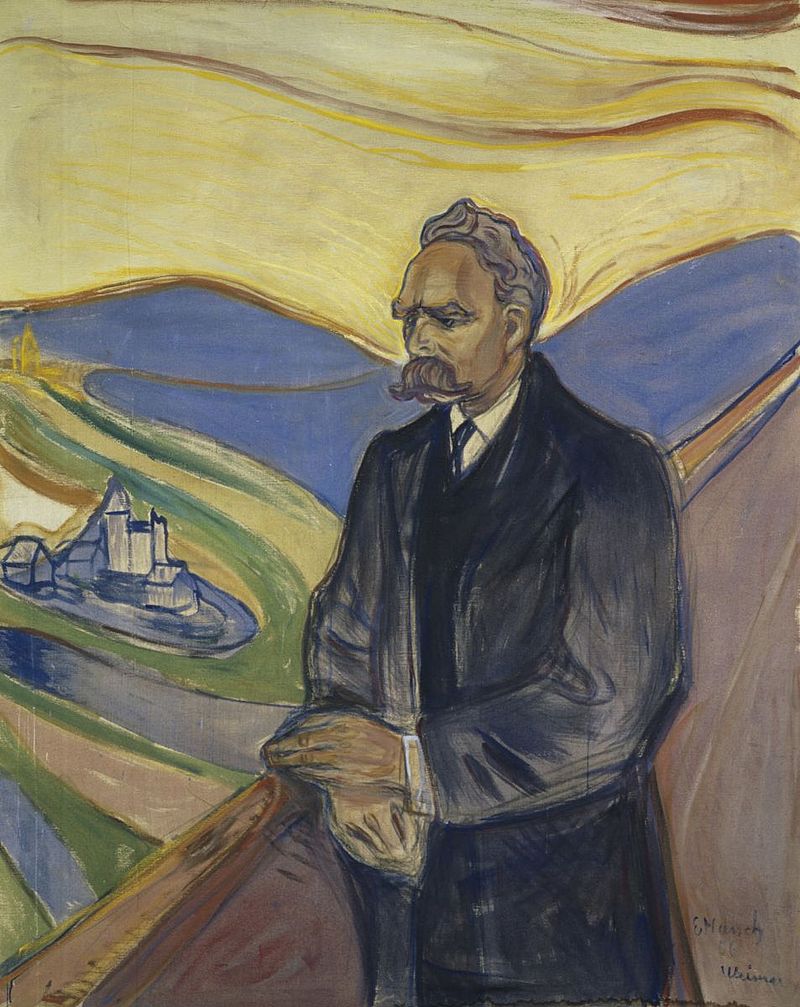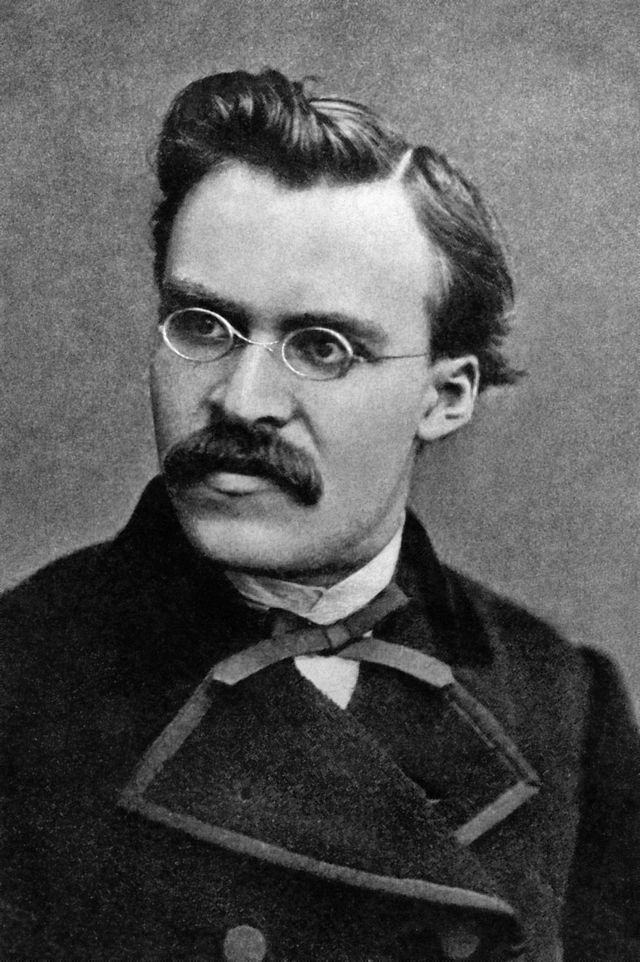Friedrich Nietzsche (1844-1900).
- Profession: Philosopher, poet, composer.
- Residences: Germany.
- Relation to Mahler:
- Correspondence with Mahler:
- Born: 15-10-1844 Rocken (near Leipzig), Germany.
- Died: 25-08-1900 Weimar, Germany.
- Buried: Rocken cemetery, Rocken (near Leipzig), Germany.
Friedrich Wilhelm was a German philosopher, cultural critic, poet, composer and Latin and Greek scholar. He wrote several critical texts on religion, morality, contemporary culture, philosophy and science, displaying a fondness for metaphor and irony. Nietzsche’s key ideas include perspectivism, the will to power, the death of God, the Übermensch and eternal recurrence. One of the key tenets of his philosophy is “life-affirmation”, which embraces the realities of the world in which we live over the idea of a world beyond. It further champions the creative powers of the individual to strive beyond social, cultural, and moral contexts.
Nietzsche’s attitude towards religion and morality was marked with atheism, psychologism and historism; he considered them to be human creations loaded with the error of confusing cause and effect. His radical questioning of the value and objectivity of truth has been the focus of extensive commentary, and his influence remains substantial, especially in schools of continental philosophy such as existentialism, postmodernism, and post-structuralism. His ideas of individual overcoming and transcendence beyond structure and context have had a profound impact on late-twentieth and early-twenty-first century thinkers, who have used these concepts as points of departure in the development of their philosophies.
Nietzsche began his career as a classical philologist—a scholar of Greek and Roman textual criticism—before turning to philosophy. In 1869, at age 24, he became the youngest-ever occupant of the Chair of Classical Philology at the University of Basel. He resigned in 1879 due to health problems that plagued him most of his life. In 1889, at age 44, he suffered a collapse and a complete loss of his mental faculties. The breakdown was later ascribed to atypical general paresis due to tertiary syphilis, but this diagnosis has come into question. Nietzsche lived his remaining years in the care of his mother (until her death in 1897) and then his sister Elisabeth Förster-Nietzsche. He died in 1900 of what was thought to be a stroke, however re-examination of Nietzsche’s medical evaluation papers show that he almost certainly died of brain cancer.
As his caretaker, his sister assumed the roles of curator and editor of Nietzsche’s manuscripts. Förster-Nietzsche, the widow of prominent German nationalist and antisemite Bernhard Förster, reworked Nietzsche’s unpublished writings to fit her own ideology. Often she did so in ways contrary to her brother’s stated opinions, which were strongly and explicitly opposed to antisemitism and nationalism. Through Förster-Nietzsche’s editions, Nietzsche’s name became associated with German militarism and Nazism, although later 20th-century scholars have counteracted this conception of his ideas.
Friedrich Nietzsche and Gustav Mahler
Nietzsche made an impact on composers during the 1890s. Writer on music Donald Mitchell notes that Gustav Mahler was “attracted to the poetic fire of Zarathustra, but repelled by the intellectual core of its writings.” He also quotes Gustav himself, and adds that he was influenced by Nietzsche’s conception and affirmative approach to nature, which Mahler presented in Third Symphony using Zarathustra’s roundelay. Frederick Delius has produced a piece of choral music A Mass of Life based on a text of Thus Spoke Zarathustra, while Richard Strauss (who also based his Also sprach Zarathustra on the same book), was only interested in finishing “another chapter of symphonic autobiography”.
Gustav Mahler first came across Friedrich Nietzsche’s philosophy in 1891, two years after Nietzsche’s mental breakdown. While Mahler admired Nietzsche’s bold and polemical writing, he ultimately decided that he was not fond of the philosopher. The conductor Bruno Walter noted a revealing aesthetic objection, that Mahler, who wrote the longest symphonies in the standard repertoire, was probably unimpressed by Nietzsche’s pithy, aphoristic style.
But Mahler’s eventual dismissal of Nietzsche didn’t stop him from setting a passage of Thus Spake Zarathustra to music in his third symphony in 1896 and, for a time, dubbing the entire symphony The Gay Science after Nietzsche’s 1882 work. If Nietzsche had stayed lucid for six or seven more years, he would almost certainly have had an opinion on this young, energetic force in music. From Nietzsche’s own opinions on music, it seems very likely that he would have found much to appreciate in Mahler as both a composer and a man.
An important element of Mahler’s music is his use of folk song. Mahler was by no means unique in this regard, but few composers integrated folk elements so fully into his style. His Symphony No. 1 contains a parody of the popular children’s tune “Frère Jacques,” and his first, second, and ninth symphonies feature Ländler in place of the traditional scherzo. In each of these works, lighter folk elements are either juxtaposed with much darker or violent movements, or are themselves transfigured into something grotesque and indiscernible.
From his own writings, it seems that Nietzsche thought highly of folk music. In section six of The Birth of Tragedy, Nietzsche writes that folk song is “a union between the Apollonian and the Dionysian…the musical mirror of the world…the primordial melody.” Nietzsche, with his wish to fuse the Dionysian (ecstatic, non-rational) and Apollonian (epic, rational), would surely have appreciated Mahler’s use of folk elements in his massive symphonies.

Portrait of Friedrich Nietzsche by Edvard Munch (1906).
Among the targets of Nietzsche’s potential criticisms are Mahler’s religious views, which remain a subject of debate among scholars. Mahler converted from Judaism to Catholicism in 1897. It was partly over Richard Wagner’s late Catholicism that Nietzsche grew disenchanted with the older composer, so one might argue that he would reserve the same criticism for Mahler.
However, Mahler’s conversion has often been seen as a practical maneuver to secure his directorship of the Vienna Court Opera, which at the time forbade Jews from holding the post. Mahler believed in God, but not in a traditional Christian framework: in a 1901 letter to his wife he writes that “all revelatory beliefs…would inevitably lead to misunderstanding, incomprehension, oversimplification…until finally the work and its creator grew distorted beyond recognition.” In any case, Nietzsche praises Mendelssohn despite his conversion, so there is probably no reason that he would resent Mahler for his.
Nietzsche is well-known for his dismissal of Beethoven as merely transitional, even though his own doctrine of “great suffering” seems almost modeled to describe a Beethovenian figure, which Mahler undoubtedly was. In the late 1900’s, Mahler, facing an anti-Semitic press, a campaign against his directorship of the Vienna Court Opera, the death of his daughter, an increasingly troubled marriage, and his own contraction of a terminal heart disease, turned to writing symphonies that are alternately bitter, resigned, and elegiac. Long before this point, Mahler conceived of his symphonies as epic philosophical statements.
In a letter to a friend, he described the underlying meaning of his second symphony: “What did you live for? Why did you suffer? Is it only a vast terrifying joke? We have to answer those questions somehow if we are to go on living…indeed, even if we are only to go on dying!” Although Mahler was only posing these particular questions in his second symphony, in every one of his symphonies there is some sort of movement from darkness, anguish, or anxiety to triumph or acceptance. Mahler’s admirers often cite his ability to turn the pain of his own life into affirming and uplifting art as his lasting, unique contribution to music—an ability, to quote Beyond Good and Evil, of “interpreting and exploiting suffering.”
In pieces like the tenth symphony, when, in the last movement, blasts from the bass drum intermittently interrupt a tuba solo and an eerily quiet orchestra, or the second, in which a stormy opening and funeral march moves to a hymn and a choral finale, Mahler perhaps came as close to answering philosophical questions as a composer can. Although his ideas remain debated and misunderstood to this day, Nietzsche’s core message is unmistakable: in a world without an afterlife or God, the only thing left to save humanity from Nihilism is a quasi-religious embrace of life itself. In this respect, Nietzsche would certainly have much to appreciate in Mahler, who was giving a similar answer to the 19th century’s most troubling questions through his world-affirming, all-embracing symphonies.

The Nietzsche Stone, near Surlej at Lake Silvaplanersee, Oberengadin, Switzerland. The inspiration for Thus Spoke Zarathustra. (1888).
Curiously, the year before Strauss wrote his “Zarathustra” piece, Mahler set a poem from Nietzsche’s book as a movement in his 3rd Symphony, part of a grand scheme he had planned with an elaborate outline of what the different movements would be, giving them a detailed “program,” as we call it, to let the listener know what he’s up to at any given time.
See also: House Nietzsche.



